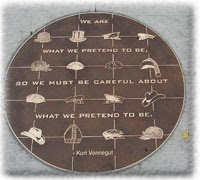
Malcolm was scanning the Irish Times in its moment of self-congratulation: Dublin was to be the next UNESCO city of literature.
Fair enough, even if some of Eileen Battersby's claims on "literary Dubliners" pressed the limits of l'actualité:
Seamus Heaney Awarded the Nobel Prize for Literature in 1995. While Heaney is very much identified with his native Northern Ireland, since 1976 he has lived in Dublin ...
Her claim on Oliver Goldsmith is even more dubious, depending as it is on an undergraduate course in TCD and a statue.
Were her hand also in the accompanying editorial, it had there a surer touch:
The submission to Unesco goes straight to the point when it states that “Dublin’s chief credentials as a City of Literature lie in the historical body of work that has come from its writers over the centuries and from the equally acclaimed contemporary output of writers native to, or living within, the city’s confines”.
Sometimes out of rejection or disillusionment with the home place, but often for economic reasons, many of those same writers chose escape and exile: Richard Brinsley Sheridan, Bram Stoker, Wilde, Shaw, O’Casey, Beckett and most famously the author who declared that if the city were to vanish overnight it could be reconstructed from the pages of his quintessential Dublin novel Ulysses .
But there are others who stayed or finally settled in the city and that litany of names is equally illustrious: Mangan, Yeats, Behan, Flann O’Brien, Kinsella and Austin Clarke who, like Swift, returned after years spent in London.
As well as the writers native to the city, many others, by making it their home, have enriched its literary DNA: McGahern came from Leitrim, Kennelly from Kerry, Cronin from Wexford and Heaney from Derry.
When he once remarked that the city had its share of “assassins whose weapons are the tongue and the typewriter”, the poet Brendan Kennelly, no doubt, was in a playful mood. But the sense of Dublin as a writers’ city is all-pervading and the tradition lives on in the many contemporary novelists, poets and playwrights who today continue with the task of helping us in our self-understanding as a people. “Strumpet City” can indeed hold her head high as a city of literature.
What caught Malcolm's attention even more firmly was the list of previously-designated "cities of literature": Edinburgh, Melbourne, and Iowa City.
Edinburgh is too obvious: no explanation needed.
Melbourne? Well, UNESCO's own definition is:
... a city of extraordinary diversity in literary activity, Melbourne is a vibrant arena for the creation of literary works. The capital of the south-eastern state of Victoria and a major business centre within the Asia-Pacific region is widely acknowledged as Australia's cultural capital.
"Australia's cultural capital" My, my! Just think of the competition!
As for native Melbourne literary figures, there's obviously Germaine Greer, and Jim Morrison ... and the Dirty Digger ... and the astral Kylie ...
But Iowa City? Why?
Well, Malcolm, prepare to be amazed:
It has a strong literary history and is the home of the Iowa Writers' Workshop, whose graduates include John Irving, Flannery O'Connor, T.C. Boyle and many other prominent American authors ...
This literary heritage is also shown in the Iowa Avenue Literary Walk, a series of bronze relief panels that feature authors' words as well as attribution. The panels are visually connected by a series of general quotations about books and writing stamped into the concrete sidewalk. All 49 authors and playwrights featured in the Literary Walk have ties to Iowa.
But as the Vonnegut quotation on that Literary Walk pertinently says:
We are what we pretend to be, so we must be careful about what we pretend to be.




















